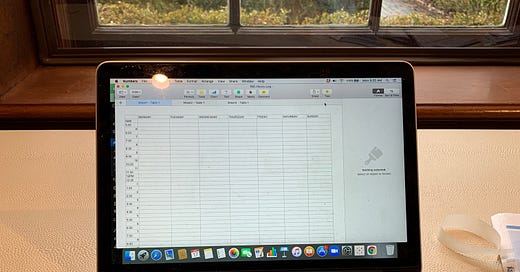Regular readers of Vanderhacks know that I don’t believe everyone needs strict lines between work and the rest of life. Lots of people work flexibly, and lots of people enjoy the substance of their jobs. They’re happy to do work at 9:30 p.m. sometimes so they can visit a child’s class at 9:30 a.m. They like to spend what could be leisure time brainstorming ideas, or reading about subjects related to work. Watching TV isn’t automatically a better way to relax than thinking about your chosen calling!
That said, there’s a difference between chosen, happy work thoughts vs. ruminating about work stressors. And if worries about work are crowding out time for everything else, that is a problem.
That was the case for someone who wrote to me several years ago, wondering how to take her mind off work. She worked with small children all day — a very meaningful job — but when she came home, she found herself continuing to think of her charges, and what happened during the day, and whether she did the right thing, or what else she could be doing. She was struggling to read or otherwise relax during her down time.
Learning to relax
I thought this was a great question. First, I hoped everyone who worked with this woman, and the parents who entrusted their children to her, knew how lucky they were to have someone so devoted to her job. But she certainly deserved to be able to relax when she was off the clock!
I had a few suggestions. For me, when I'm really ruminating about issues, I know that any sort of exercise is helpful. Caring for small children is exhausting, but a 15-20 minute walk could help boost rather than deplete energy. If there’s no good place to walk, there are a ton of online exercise videos out there. Yoga or stretching might be more of a mental break and feel easier to do than something more intense.
This woman mentioned struggling to read, but that’s often a symptom of trying to read things that require more “work.” When you're mentally exhausted, you probably won’t pick up Ulysses (at least I won’t!). Better to choose something like humor, graphic novels, or easy fiction (like romance novels) to take your mind off your workplace. Lots of libraries are on the Libby app, so you can borrow books instantly and for free. You can often even borrow magazines — which is great if that’s all you think your brain can handle.
Think about something else
There is also less space for work rumination when you’re actively thinking about different things. I suggested this women figure out a low-energy hobby that could occupy her brain in the evening. Needlework, scrapbooking, drawing, doing a puzzle, or even building a ship in a bottle are all ways to become absorbed in something that will push out other thoughts. The key to getting started on a hobby when you’re exhausted is to challenge yourself to just do 20 minutes or so, and then you can veg out in front of the TV. Usually, by twenty minutes in, you’ll be so absorbed in your project that you’ll forget what you were going to watch.
Hobbies can then be a great link to online communities devoted to these spheres — those relationships can then also help take your mind off work! This woman mentioned living in a rural area, which somewhat limited in-person evening social opportunities. But that’s why phones were invented. A few 15 minute phone calls each week to friends and family who live elsewhere can definitely focus the brain on other things.
Work can be great, but no one needs to think about work all the time. For people who are prone to rumination, I also suggest recognizing small victories. You might not be able to clear your thoughts entirely, but even a few minutes thinking about something else is great. Over time, you might be able to scale that up to more minutes. And that would be a big win.



